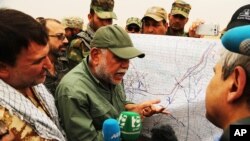CAIRO — An unidentified drone or drones attacked a Shiite militia base in northern Iraq early Friday, reportedly destroying parts of a weapons depot and causing casualties among Shiite militiamen and advisers from Iran's Islamic Revolutionary Guard Corps and Lebanon's Hezbollah.
No group claimed responsibility. The U.S. military denied any responsibility in the attack, which coincided with the U.S. downing of an Iranian drone in the Strait of Hormuz that was reportedly threatening a U.S. naval vessel.
Amateur video showed people shouting and explosives detonating at the Shiite militia camp following the drone attack near Tuz Kharmato. Some witnesses said several drones attacked the site, although other reports said the base might have been shelled, setting fire to a weapons depot.
Saudi-owned Al Arabiya TV reported that ballistic missiles were being put together at the site under the supervision of Hezbollah and the Revolutionary Guards. The report said the base belonged to the Shiite Badr Brigades, under the command of pro-Iranian politician Hadi al-Ameri.
Al-Ameri warned several days ago of the dangers of a potential regional conflict between the United States and Iran.
He said Iraq must try to stay out of a conflict in the Persian Gulf between the U.S. and Iran, which would have serious consequences for Baghdad.
Order to Shiite militias
Tensions also were high inside Iraq as a result of an order nearly two weeks ago by Prime Minister Adel Abdel Mehdi calling on Shiite militia forces, also known as Hushd al-Shaabi, to disarm and join the regular Iraqi armed forces.
He said Shiite militiamen who wanted to keep their arms would have to join the armed forces, while those who wished to keep their political affiliations would need to disarm.
The attack on the Badr militia camp came just before the deadline for the closure of Hushd al-Shaabi camps, and it was not clear that any of the camps was preparing to conform with the prime minister's order.
Tha'er Bayati, a Sunni tribal leader in Anbar province, told Al Arabiya there were multiple explosions inside the camp from Iranian ballistic missiles that were hit in the drone attack. He also said there were heavy casualties in the attack, although Iraqi government media reported only minor casualties.
Hilal Khashan, who teaches political science at the American University of Beirut, told VOA that he suspected Sunni groups with ties to Saudi Arabia might have been behind the drone attack, "in retaliation for the drone attacks on the Saudi Yanbu pipeline last month."
The U.S. believes drones in that attack, which destroyed several pumping stations, may have originated in Iraq. VOA could not confirm the claims.





